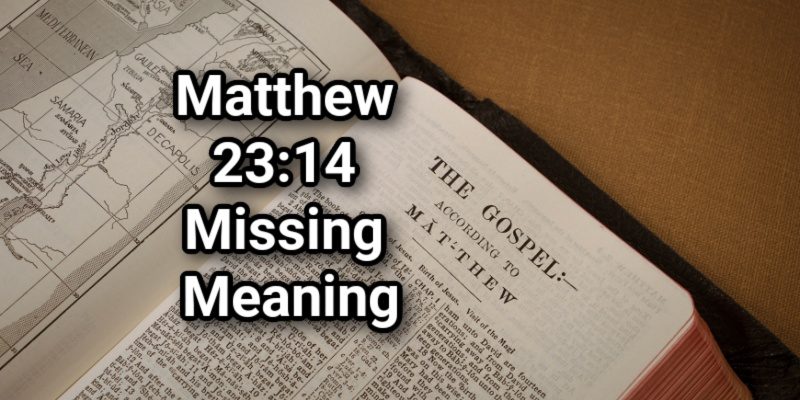Lord’s Library editors offer a Matthew 23:14 meaning with commentary on why the verse is missing from new Bible versions, for your edification.
 When trying to understand the meaning of Matthew 23:14 and see why it’s missing in modern versions, first see the verse: “Woe unto you, scribes and Pharisees, hypocrites! for ye devour widows’ houses, and for a pretence make long prayer: therefore ye shall receive the greater damnation.” It is either omitted altogether or buried in a footnote, claiming it does not appear in “the earliest manuscripts.”
When trying to understand the meaning of Matthew 23:14 and see why it’s missing in modern versions, first see the verse: “Woe unto you, scribes and Pharisees, hypocrites! for ye devour widows’ houses, and for a pretence make long prayer: therefore ye shall receive the greater damnation.” It is either omitted altogether or buried in a footnote, claiming it does not appear in “the earliest manuscripts.”
The omission of Matthew 23:14 is not an isolated issue. It follows the same pattern as the removal of Matthew 17:21 and Matthew 18:11: verses that contain harsh truths, spiritual urgency, or judgment are quietly discarded, leaving readers with a neutered version of the Word of God that no longer cuts to the heart as intended.
Note: We believe the Holy Scriptures are the inspired, inerrant, infallible Word of God, preserved by His providence and power. The Bible is truth without error and is the final authority in all matters of faith, doctrine, and life. It is sufficient for salvation, instruction, correction, and reproof, and it testifies from the beginning to the end of the Lord Jesus Christ. While many translations exist, we affirm the unique characteristics of the King James Bible in faithfully preserving God’s Word and remain open to the truth that God can use even imperfect versions to lead souls to Himself.
Matthew 23:14 Missing Meaning
This verse records one of Jesus’ most scathing rebukes of the religious elite. He exposes the hypocrisy of the scribes and Pharisees, who exploited the vulnerable, specifically widows, while cloaking themselves in false piety. They prayed long public prayers for show. Jesus doesn’t just rebuke their actions; He pronounces damnation—and not just damnation, but the greater damnation, reserved for those who abuse spiritual authority to enrich themselves.
This is not a comfortable verse. It doesn’t fit the mainstream church growth narrative, the seeker-friendly model, or the non-confrontational tone of contemporary religion. But it is true, and it is vital. When you remove Matthew 23:14, you eliminate a key witness to Christ’s denunciation of religious hypocrisy; you delete His warning to those who pervert spiritual leadership, and you erase a clear declaration that damnation is real, deserved, and severe for those who exploit the weak under the guise of holiness.
The argument for its removal is based on Alexandrian manuscripts—chiefly Codex Vaticanus and Codex Sinaiticus—which omit the verse. In contrast, the Byzantine text type—represented by thousands of manuscripts and underlying the Textus Receptus—includes Matthew 23:14. The King James Bible preserves this verse because it follows the majority witness, which overwhelmingly supports its inclusion.
The verse is also found in Mark 12:40 and Luke 20:47, further demonstrating that this was indeed part of Jesus’ public condemnation:
- Mark 12:40: “Which devour widows’ houses, and for a pretence make long prayers: these shall receive greater damnation.”
- Luke 20:47: “Which devour widows’ houses, and for a shew make long prayers: the same shall receive greater damnation.”
So why would anyone remove it from Matthew’s account unless they were operating under a flawed philosophy that places a small handful of in-error manuscripts above the consensus of the believing Church throughout history?
The effect, whether intended or not, is devastating. Verses like Matthew 23:14 hold spiritual leaders accountable. They strike fear into the heart of hypocrites, and they reveal God’s wrath against those who abuse authority. Without them, modern readers are left with a softer, safer Christ—one who never threatens judgment, never condemns religious corruption, and never speaks with the thunderous authority of the Living God.
That is not the Jesus of the Bible.
Matthew 23:14 belongs in your Bible. It always has. It stood unchallenged for centuries until the rise of Westcott and Hort and the critical text movement in the late 1800s. Since then, omission after omission has chipped away at the integrity of the modern Bible, and the church has suffered for it.
The King James Bible preserves the truth in full. It does not apologize for Jesus’ warnings. It does not hide the reality of damnation, and it does not edit God. And that is precisely why it continues to bear fruit, even as modern versions continue to multiply and yet fail to produce a more holy, more equipped, more powerful church.
Lord's Library is a Christian resource hub. Our editors use a variety of internet research methods like search engines, audio and video, AI, consultations with ministry leaders in the field, and more. Lord's Library should never be a substitute for reading your Bible daily as the Scriptures are to be our final authority on all matters. Lord's Library participates in affiliate programs. We may make a small commission from products purchased through this resource.
- John 5:4 Meaning: Why is it Missing in Modern Bibles? - June 21, 2025
- What Does the Bible Say About Betrayal? With Key Scriptures - June 19, 2025
- John 7:53-8:11 Meaning: Why is it Missing in Modern Bibles? - June 19, 2025














